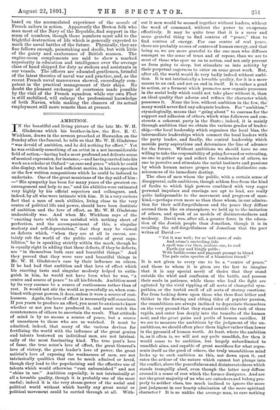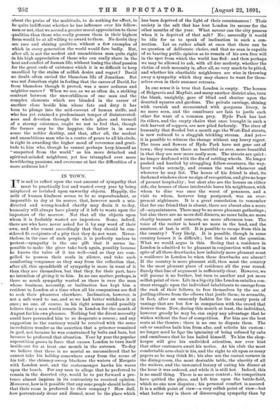AMBITION.
IN the beautiful and living picture of the late Mr. W. H. Gladstone which his brother-in-law, the Rev. E. C. Wickham, draws in the sermon preached at Hawarden on the Sunday after the funeral, he tells us that Mr. W. H. Gladstone " was devoid of ambition, and he did nothing for effect." Yet he was evidently something of an artist in a not inconsiderable field of action,—having had a most profound and delicate sense of musical expression, for instance,—and having carried into his work as a scholar at Oxford " an ease and grace " which he could also display, when he had sufficient motive, in his rare speeches or the few written compositions which he could be induced to undertake. One of the great musicians of the day said of him : —" His sympathy has been for many years of the greatest en- couragement and help to me," and his abilities were estimated very highly by his official superiors and colleagues, and, indeed, by all who were intimate with him. It is a very curious fact that a man of such abilities, living close to the very centre of political life and power, should have been destitute of ambition and the love of effect, as Mr. W. H. Gladstone undoubtedly was. And when Mr. Wickham says of the "exacting taste which was satisfied with nothing short of perfection, and the accompaniment of this, a singular modesty and self-depreciation," that they may be viewed as defects which, "when they are at all in excess, cer- tainly rob the world of the public results of great capa- bilities," he is speaking strictly within the mark, though he is equally right in adding that these defects, if they be defects, are " in themselves both rare and beautiful things." And they proved that they were rare and beautiful things in Mr. W. H. Gladstone's case by their influence on others. If he had had that ambition and that love of effect which his exacting taste and singular modesty helped to extin- guish in him, he would not have been what he was, "a centre and source of peace " to all his friends. Ambition must by its very essence be a source of restlessness rather than of rest. It would not stir the world as powerfully as, when com- bined with great powers, it does, unless it were a source of rest- lessness. Again, the love of effect is necessarily self-conscious. If you yearn to produce an effect, you must be anxious to know whether or not you have produced it, and must watch the countenances of others to ascertain the result. That attitude of mind is by no means a source of peace, but a source of uneasiness to those who are so watched. It must be admitted, indeed, that many of the various devices for fertilising the world with the influence of the great genius and talents bestowed on individual men, are not intrinsi- cally of the most fascinating kind. The true poet's love of fame, the true actor's love of effect, the great General's love of victory, the great leader's love of power, the great satirist's love of exposing the weaknesses of men, are not intrinsically qualities that can be much admired or loved, though they lead to the popularising and the effective use of talents which would otherwise "rust unburnished " and not " shine in use." Ambition especially, is not intrinsically at all a loveable quality, though it is probably one of the most useful ; indeed it is the very steam-power of the social and political world without which hardly any great social or political movement could be carried through at all. With-
out it men would be massed together without leaders, without the word of command, without the power to co-operate effectively. It may be quite true that it is a rarer and more grateful thing to find centres of "peace," than to find centres of energy. For one centre of real peace, there are probably scores of centres of human energy, and that being so, we are more grateful to the one man who diffuses amongst us the sense of trust and of repose, than we are to most of those who spur us on to action, and not only prevent us from going to sleep, but stimulate us into activity by their perpetual eagerness to enter on some great work. But, after all, the world would do very badly indeed without ambi- tion. It is not intrinsically a loveable quality, for it is a mere means to an end, and not an end in itself. It is rather a goad to action, or a ferment which promotes new organic processes in the social body which could not take place without it, than an ideal quality that adorns and refines the character which possesses it. None the less, without ambition in the few, the many would never find any adequate leaders. For " ambition," etymologically, means that "going about" to canvass for the support and adhesion of others, which wins followers and con- structs a coherent party in the State ; indeed, it is mainly through ambition that we obtain the various grades of leader- ship,—the local leadership which organises the local bias, the intermediate leaderships which connect the local leaders with the party leader, and finally, the central leadership which moulds party aspirations and determines the line of advance for the future. Without ambitions we should have no one willing to take the responsibility of going forward or retreating, no one to gather up and reflect the tendencies of others, no one to perceive and stimulate the social instincts and passions by which human nature gropes its way to a distinctive con- sciousness of its immediate destiny.
The class of men whom the public, with a certain sense of disapproval, calls ambitious, though seldom free from the kind of faults to which high powers combined with very eager personal impulses and cravings are apt to lead, are really quite indispensable to the movement and progress of man- kind,—perhaps even more so than those whom, in our admira- tion for their self-forgetfulness and the peace they diffuse around them like an atmosphere, we hold up to the imitation of others, and speak of as models of disinterestedness and modesty. David was, after all, a greater force in the educa- tion of the Jewish people than Jonathan, though it is in recalling the self-forgetfulness of Jonathan that the poet writes of David " Yet it was well ; for so 'mid cares of rule And crime's encircling tide A spell was o'er thee, zealous one, to cool Earth-joy and kingly pride ; With battle-scene and pageant prompt to blend The pale calm spectre of a blameless friend."
It is not given to every one to be a " centre of peace," and those to whom it is given are the last to imagine that it is any special merit of theirs that they stand outside the whirl and confusion of the battle, and possess their souls in patience, while those who lead the fight are agitated by the vivid rippling of all sorts of changeful sym- pathies, or the turbid swell of all sorts of stormy emotions. Far from looking down upon those who thus float hither and thither in the flowing and ebbing tides of popular passion, the unambitious are always inclined to depreciate themselves on the very ground that they stand outside the rush of these rapids, and enter less deeply into the tumults of the human soul, and the great pains and perils of human sacrifice. If we are to measure the ambitious by the judgment of the un- ambitious, we should often place them higher rather than lower in the pyramid of human worth. At least, where the ambition
is, as it often is, we will not say quite unselfish, for then it would cease to be ambition, but largely subordinated to
unselfish aims, and capable of great sacrifices for what repre- sents itself as the good of others, the truly unambitious mind looks up to such ambition as this, not down upon it, and rates the ardour of the nature which cannot but plunge into the conflict, above the peacefulness and disinterestedness which stands tranquilly aloof, even though the latter may diffuse around it a sense of rest which the former dissipates. And are not the great majority of us who are onlookers and belong pro- perly to neither class, too much inclined to ignore the more just judgment in our hearty admiration of the more spiritual character ? It is so unlike the average man, to care nothing .:about the praise of the multitude, to do nothing for effect, to be quite indifferent whether he has influence over his fellow- men or not, that we accord a greater moral appreciation to these -qualities than those who really possess them in their highest form would be at all willing to award to them. No doubt they -are rare and shining qualities, without a few examples of which in every generation the world would fare badly. But, -after all, is not the modest and unambitious man quite right .in his high appreciation of those who can really share in the heat and conflict of human life, without losing the ideal passion for the great ends of existence which it is so difficult to keep unsullied by the stains of selfish desire and regret ? David no doubt often envied the blameless life of Jonathan. But -was not Jonathan right in feeling that the career of David, far from blameless though it proved, was a more arduous and -mightier career ? When we see, as we so often do, a striking -contrast between the unworldliness of one man and the Complex elements which are blended in the career of another close beside him whose fate and duty it has been to plunge into the mid-current of human strife, and who has yet retained a predominant temper of disinterested- ness and devotion through the whole glare and turmoil -of a stormy existence, ought we not to feel that, though the former may be the happier, the latter is in some aense the nobler destiny, and that, after all, the modest and unambitious man who is a centre of peace to all his circle, is right in awarding the higher meed of reverence and grati- tude to him who, though he cannot perhaps keep himself as " unspotted from the world" as his more detached and spiritual-minded neighbour, yet has triumphed over more bewildering passions, and overcome at last the difficulties of a more arduous lot P



































 Previous page
Previous page